Try this: Imagine dragging yourself home from work at sunrise, the world just starting its day while yours is ending. Your stomach doesn’t know if it wants breakfast or dinner, and your brain is buzzing on empty. That’s daily life for millions of shift-workers—people who work outside the usual nine-to-five, keeping society running when most are asleep. The trouble is, the stress that comes with shift work isn’t just a nuisance; it carves deep into your health, relationships, and even how long you live. Most people never see it coming until their body or mind finally pushes back.
Why Shift Work Disrupts the Body and Mind
Shift-workers—nurses, EMTs, factory workers, night stockers, you name it—are the invisible backbone of modern society, but they’re paying for it with their health. When your work hours flip-flop randomly, or you’re up all night, you’re forcing your body to battle its own natural clock. Scientists call it the circadian rhythm, and it’s basically your internal timekeeper that tells every cell whether it’s time to wake up or sleep. Flip that clock too much, and everything from your immune system to your hormones gets scrambled.
Here’s the kicker: A massive review by the World Health Organization marked night shift work as a “probable carcinogen.” That’s not fear-mongering—several long-term studies saw a higher risk of everything from heart disease to metabolic problems among those working nights for years. Sleep deprivation is just the start. You get stuck in a cycle: weird hours make sleeping hard, poor sleep raises stress hormones like cortisol, and that wrecks your mood, appetite, and ability to focus. I’ve seen it first-hand in my own family. When my sister (a nurse) switched from regular to rotating shifts, her energy tanked, she caught every cold at work, and stress made her appetite spiral.
And let’s talk mental health. Shift work ups your odds of anxiety and depression—more than double compared to regular day workers. Why? Years of social activities—family dinners, kids’ bedtime stories, hanging with friends—often become impossible. The loneliness can sneak up fast, and the relentless fatigue makes it hard to break out. There’s a reason researchers found shift-workers are more likely to call in sick or need mental health support.
Check out this snapshot:
| Health Issue | Day Workers (%) | Shift Workers (%) |
|---|---|---|
| Poor Sleep Quality | 14 | 47 |
| Chronic Fatigue | 23 | 61 |
| Depression Diagnosed | 12 | 26 |
| Heart Disease Risk | 10 | 21 |
With these risks spelled out, it’s clear stress isn’t an ‘extra’ problem for shift-workers—it’s front and center. But if you learn the right ways to manage it, you can nudge your body and mind back on track.
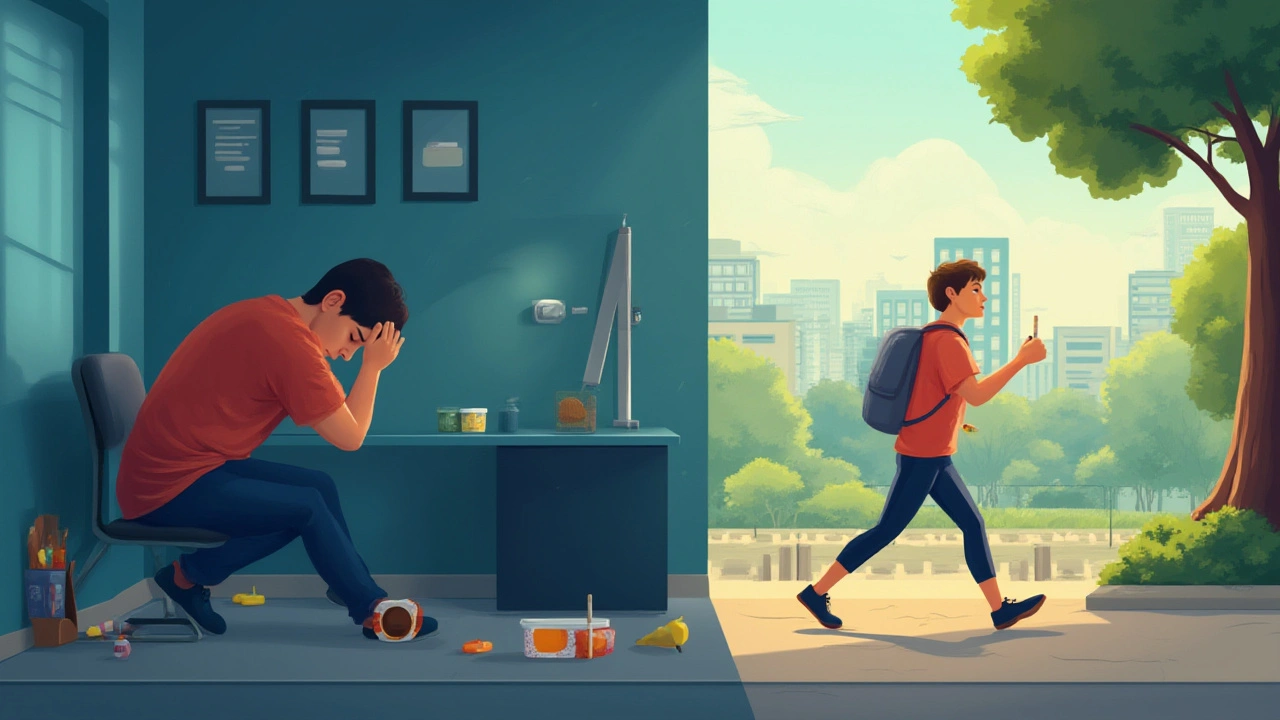
Practical Stress Management Tips for Shift-Workers
Beating shift-work stress doesn’t mean you need to quit your job or overhaul your whole life. A lot of it comes down to stacking small, doable habits that chip away at the chaos. Here’s what actually works, based on years of research (and a lot of trial-and-error from shift-workers themselves):
- Set your sleep cave: Make your bedroom as close to a bat cave as possible—dark, silent, and a bit cool. Blackout curtains and white-noise machines block out the world so you’re not waking up every time a car honks outside.
- Stick to wind-down routines: Give your brain cues it’s time to sleep, no matter the hour. That might mean reading a trashy novel for 10 minutes, taking a warm shower, or doing some gentle stretches. The routine’s the magic, not the hour you do it.
- Guard your naps: On rough rotations, a strategic 20-minute nap before your shift can seriously boost focus and mood. Just don’t go long enough to hit deep sleep or you’ll wake up groggy.
- Don’t skip meals: Your body still needs regular fuel, even if your appetite’s a mess. Try to eat something small every 4-5 hours—even yogurt or a banana is better than running on fumes from vending machine snacks.
- Hydrate, hydrate, hydrate: It sounds obvious but dehydration creeps in fast, especially during overnight shifts when you’re less likely to notice thirst. Keep a water bottle on hand and drink even if you’re not feeling thirsty.
- Move when you can: Tiny bursts of movement break up stress chemicals. If you can, do a speed walk before your shift or blast a song and dance in the break room. Movement doesn’t need to be a full workout.
- Set boundaries—without guilt: Family and friends might not get your weird schedule, but it’s okay to say no to daytime social stuff. Let people know when you’re off-limits for calls or visits. Your rest is not up for negotiation.
- Clock out mentally: Build buffer rituals to separate work and home life. Even five minutes of deep breathing or a podcast on the drive home helps reset your brain. Otherwise, the stress keeps tagging along, even in your dreams.
- Lean on your village: I’ve heard from plenty of shift-workers who’ve formed “night owl” groups—text threads, support circles, or even online forums. Sharing tips and venting to people who get your schedule is pure gold.
- Tame the tech: Blue light from phones or TVs can torch your sleep rhythm. If you’re awake at odd hours, wear blue light glasses or use your phone’s “night mode” a couple hours before sleep.
Workplaces are catching on, too. Some hospitals now give nurses rotating shifts that move forward instead of backward (think day-to-evening-to-night instead of the reverse), which helps your body adjust more naturally. In some high-stress jobs like air traffic control, built-in nap breaks aren’t just allowed—they’re recommended. Nobody’s saying these fixes erase the stress, but every win counts.
Still, some things just suck more on the night shift—like trying to keep your family together or finding daycare for kids. My own son, Sorrel, once called me a "sleepy vampire" because I was always yawning. That stung a bit. But over time, we set up special routines just for our family (like pancake dinners after my weekend shifts). A big part of managing stress for shift-workers is making the ‘weird’ hours feel normal at home, not just at work.

Staying Ahead: Recognizing Trouble Signs and Getting Support
It’s easy to brush off stress as “just part of the job,” but ignoring warning signs usually bites back later. So, what red flags should you watch for? Chronic exhaustion (even after time off), snapping at loved ones, trouble focusing, pounding headaches, stomach issues—they’re not normal overtime side effects. They are a signal from your body that something’s out of whack.
If you notice your mood is sinking or you’re dragging every minute you’re awake, it’s not weak to ask for help. Doctors can suggest sleep-friendly medications or check for deeper issues (like sleep apnea), which is surprisingly common in shift-workers. There are therapists who work around weird schedules, and a ton of mental health support lines now have 24/7 chat, so you can find help at 3 am if you need.
Workplaces are part of the fix, too. If you’re comfortable, talk to your boss about shift patterns that don’t whip you between days and nights every week. Some companies pay extra for night shifts, but smart employers are starting to offer real perks—like extra health screenings and stress workshops. Demand those if you don’t see them. If you work in a unionized field, ask your rep to negotiate for programs to address stress management directly.
At home, it helps to have honest talks with family. Little things matter: posting your work schedule on the fridge, marking “do not disturb” nap hours, setting up call times with friends during your actual ‘evenings’ (even if they’re at 7 am). If you’re a parent, don’t hide your exhaustion from your kids. Instead, explain why you need sleep, so they see rest as important—not just for “lazy grown-ups.” Sorrel learned to slip me breakfast-in-bed notes, and it became our little tradition.
Don’t buy the myth that only “weak” people crack under shift work stress. Studies from 2023 showed over 70% of night-shift healthcare workers checked at least two boxes for clinical burnout. That doesn’t mean 70% are bad at their jobs—it means the system needs reshaping, and so do our expectations of rest and recovery.
The best you can do is stay alert to how your body and mind are changing, stack up the tips that help, and don’t beat yourself up when it’s tough. The right habits, solid support networks, and little wins every week—these are your toolkit. Night may be your workday, but with the right strategies, you can make the daylight yours again.

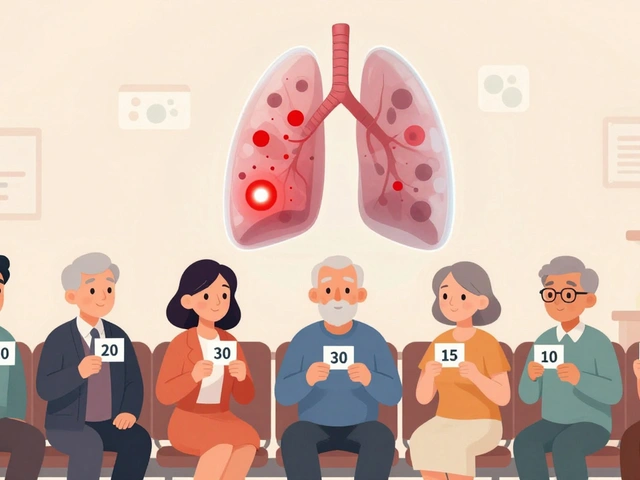
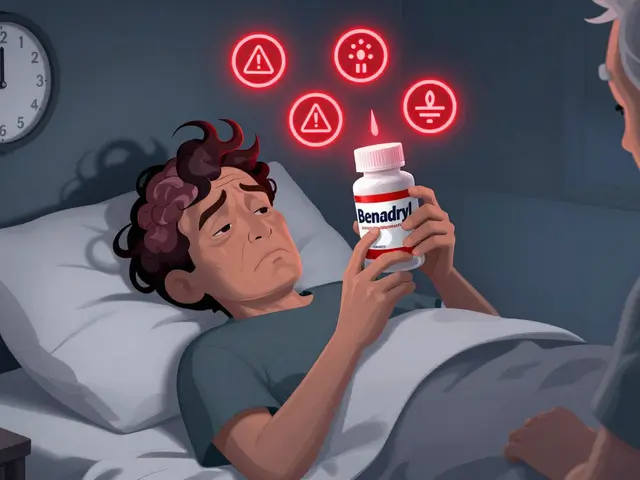
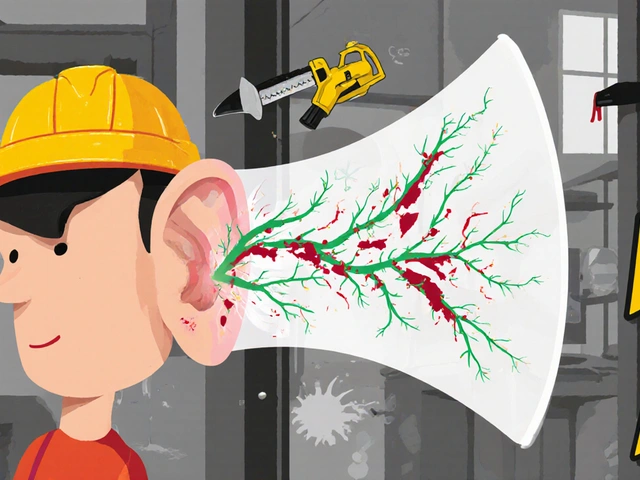
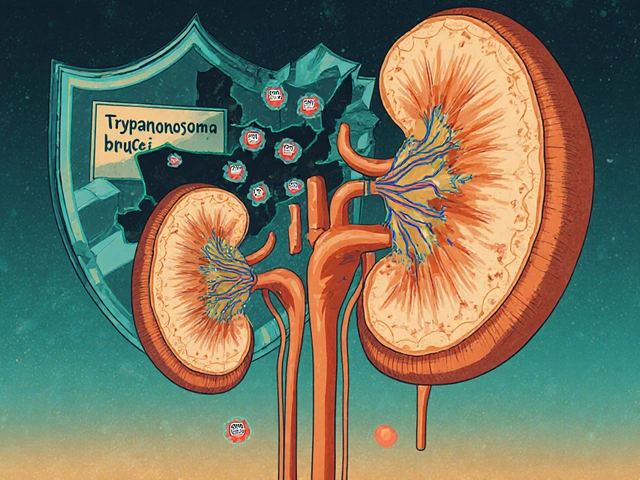

Ady Young
23 July, 2025 . 13:46 PM
I used to work nights at a warehouse and honestly? The blackout curtains were the only thing that saved my sanity. I thought I was fine until I realized I hadn’t slept a full night in three weeks. Now I use those + a fan for white noise. No more waking up to garbage trucks. Game changer.
Also, naps. Don’t sleep past 25 minutes. I learned that the hard way after waking up feeling like I’d been hit by a truck.
Travis Freeman
25 July, 2025 . 08:46 AM
This post hit me right in the feels. My cousin’s a paramedic and she’s been doing rotating shifts for 12 years. She told me she doesn’t even recognize herself anymore-used to love cooking, now she survives on microwave meals and energy drinks. But she started doing that 10-minute wind-down routine you mentioned? She says it’s the first time in years she’s actually looked forward to sleep. Small wins, y’know? Keep sharing these tips. They matter more than you think.
Sean Slevin
25 July, 2025 . 12:17 PM
Okay, so-just saying-the WHO calling night shifts a ‘probable carcinogen’? That’s wild. I mean, if you think about it, we’ve been fighting circadian rhythm disruption since the invention of the lightbulb, right? And now we’ve got whole industries built on it. It’s like we’re all lab rats in a giant, sleep-deprived experiment. And nobody’s even talking about the dopamine crash from being awake while the world sleeps. It’s not just fatigue-it’s existential dissonance. I’ve felt it. You start missing sunrises, then seasons, then… your own memories. I’m not saying quit your job. But maybe… maybe we need to restructure society before we all turn into zombies with health insurance.
Chris Taylor
26 July, 2025 . 02:00 AM
My mom’s a nurse on nights and she used to get so angry over little stuff. Then she started doing the buffer ritual thing-just sitting in the car for five minutes after work, listening to jazz. She says it’s like hitting a reset button. Now she’s calmer, sleeps better, even started gardening. It’s not magic. Just a tiny pause. I wish more people knew how powerful that is.
Melissa Michaels
26 July, 2025 . 23:55 PM
Hydration is critically underemphasized in shift work literature. Dehydration exacerbates fatigue, impairs cognitive performance, and increases cortisol levels. A 2021 study in the Journal of Occupational Health demonstrated that consistent water intake during night shifts improved alertness by 37% compared to control groups. Recommend carrying a 1L bottle and setting hourly reminders. Also, avoid sugary drinks-they cause crashes that compound sleep debt. Simple. Evidence-based. Effective.
Nathan Brown
27 July, 2025 . 06:44 AM
I’ve been on nights for 8 years. The blue light glasses? Lifesaver. But here’s the thing nobody says-you’re not just fighting your body. You’re fighting the whole world’s schedule. Everyone else is asleep, so your doctor’s office is closed. Your therapist is on vacation. Your kid’s school event is at 3pm. You’re invisible. And yeah, I use emojis sometimes because words aren’t enough. 😔☕🌙
Also, my wife and I started eating dinner at 7am. We call it ‘breakfast’ now. It’s weird. But it’s ours.
Matthew Stanford
28 July, 2025 . 20:07 PM
Love the tips. Especially the ‘clock out mentally’ part. I work security and used to bring work stress home. Now I do a quick walk around the block after my shift. Doesn’t matter if it’s raining. Just moves the energy out. Small thing. Big difference. Also, if you’re a parent-don’t apologize for needing sleep. Your kids need a present parent, not a tired ghost.
Olivia Currie
29 July, 2025 . 05:38 AM
OH MY GOD YES. I’m a barista on the night shift and I used to cry in the walk-in fridge because I missed my niece’s birthday. I thought I was just ‘bad at life.’ Turns out I was just chronically sleep-deprived and socially isolated. I started joining that online night owl group you mentioned? We text memes at 2am. I feel less alone. I actually smiled today. For the first time in months. Thank you for writing this. I’m not broken. I’m just working in the dark.
Curtis Ryan
30 July, 2025 . 20:52 PM
Bro I tried the nap thing but I always wake up like a zombie. Then I started chewing gum during my shift-just like, mint gum. Weird right? But it kept me alert without coffee crashes. Also, I play lo-fi beats on my headphones during cleanup. Sounds dumb but it’s like my little ritual. And I swear my boss noticed I’m less grumpy. Small wins, man. Small wins.
Rajiv Vyas
31 July, 2025 . 12:39 PM
Lol this is all corporate propaganda. They want you to think you can ‘manage’ being exploited. Night shifts are a health hazard because the system wants cheap labor. They don’t care if you get cancer. They just want you to wear blue light glasses and drink water so they don’t have to pay overtime. Wake up. The real fix isn’t naps-it’s unions. And maybe not working for these soul-sucking corporations in the first place.